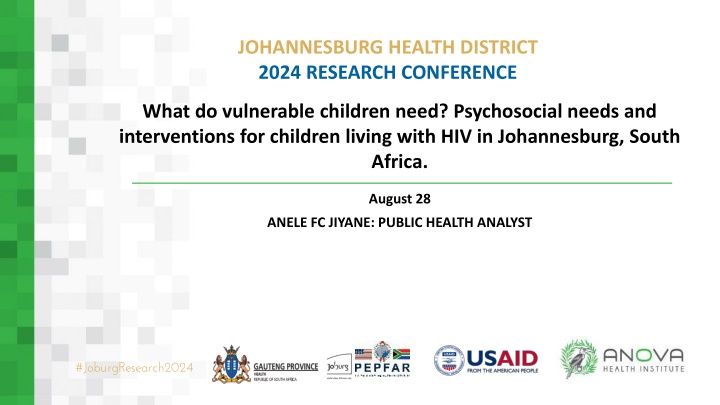
Psychosocial Needs and Interventions for Children Living with HIV in Johannesburg
Explore the psychosocial needs and interventions for children living with HIV in Johannesburg, South Africa, as presented at the 2024 Research Conference. The study highlights challenges faced by HIV-positive children, adolescents, and youth, emphasizing the importance of comprehensive care to improve health outcomes and quality of life. Key findings reveal common vulnerabilities and services provided, shedding light on areas for improvement in supporting vulnerable children.
Download Presentation

Please find below an Image/Link to download the presentation.
The content on the website is provided AS IS for your information and personal use only. It may not be sold, licensed, or shared on other websites without obtaining consent from the author. If you encounter any issues during the download, it is possible that the publisher has removed the file from their server.
You are allowed to download the files provided on this website for personal or commercial use, subject to the condition that they are used lawfully. All files are the property of their respective owners.
The content on the website is provided AS IS for your information and personal use only. It may not be sold, licensed, or shared on other websites without obtaining consent from the author.
E N D
Presentation Transcript
JOHANNESBURG HEALTH DISTRICT 2024 RESEARCH CONFERENCE What do vulnerable children need? Psychosocial needs and interventions for children living with HIV in Johannesburg, South Africa. August 28 ANELE FC JIYANE: PUBLIC HEALTH ANALYST #JoburgResearch2024
Outline Background Methodology Key Findings Best practices from the programme Key recommendations Conclusion #JoburgResearch2024
Background South Africa has one of the highest HIV prevalence rates globally, with significant impacts on younger populations. Anova Health Institute and USAID s OVC programs collaborate with the Johannesburg Department of Health to provide services for children, adolescents, and young people living with HIV Children living with HIV in Johannesburg face multifaceted challenges that require comprehensive, holistic interventions. Retention in Care: Retention rates among HIV-positive children and adolescents are lower compared to adults, leading to poorer health outcomes, increased mortality, and higher rates of transmission. Child and Youth Care Workers (CYCW) use a case management approach, handling facility referrals and conducting home visits. The PEPFAR framework supports orphans and vulnerable children across the Safe, Stable, Healthy, and Schooled domains. We aimed to describe the needs of HIV-positive children, adolescents, and youth in Johannesburg, and the services provided to them by Child and Youth Care Workers (CYCWs). #JoburgResearch2024
Methodology 1. Study Design A retrospective record review was conducted 2. Study Setting and Population The study focused on children, adolescents, and youth living with HIV in Johannesburg. Data was captured from clinical files from March 2021 to September 2022. 3. Study Procedure Needs assessment forms (CYCW stationery) were reviewed from clinical files. The Safe, Stable, Healthy, and Schooled framework was used to analyze the frequency and percentages of common vulnerabilities and services provided. Data was disaggregated by age group to assess specific needs and interventions. #JoburgResearch2024
Key Findings We reviewed 426 health facility records, Stable Category: 306 children (77%) had needs Common issues: Need for grants: 135 (41%), Orphanhood: 171 (51%) Safe Category: 216 children (50%) had needs Pressing needs: Emotional problems: 81 (38%), Communication problems: 73 (34%) and No mentor: 62 (29%) Schooled Category: 165 children (39%) had needs Common needs: Repeated grades: 79 (48%)School drop-out: 47 (28%) Young motherhood: 39 (24%) Healthy Category: 142 children (33%) had needs Common needs: Treatment interruption: 109 (76%)TB exposure: 28 (20%) #JoburgResearch2024
Key Findings Pressing needs included: Emotional and communication problems, treatment interruption, repeated grades, need for grants and Orphanhood Most Frequently Provided Services: Counseling and psychotherapy: 202 (34%) Re-engagement, support, and reminders: 159 (27%) Assistance with school enrollment, including Early Childhood Development: 82 (14%) Application for identity documents: 72 (12%) Education on Sexual and Reproductive Health (SRH) and treatment literacy: 65 (11%) We successfully brought over 80% of our beneficiaries back into care and connected them to necessary clinical services. We also assisted with obtaining birth certificates, accessing grants, enrolling or re- enrolling in mainstream and special needs schools, and securing bursaries. Additionally, we supported child protection cases, ensuring holistic development in line with the project's four aims #JoburgResearch2024 Age Group with the highest proportion of concerns: 15-19 years
Best practices from the programme Life space work: has proven to be the most effective approach enhances retention in care by meeting beneficiaries in familiar environments such as homes, schools, or healthcare facilities where they feel comfortable and open to communication. This approach builds trust, facilitates personalized care planning, and addresses specific needs, improving treatment adherence and long- term retention in care. Key elements that contribute to their success include: Holistic Support: The (CYCWs) address not only the medical needs of children and adolescents but also their psychological, social, and emotional needs. This comprehensive support helps young patients manage the complexities of living with HIV and improves their ability to adhere to ART regimens consistently. Developmentally Appropriate Engagement: The (CYCWs), approaches are designed to be age- appropriate and responsive to the developmental stages of children and adolescents. This means using communication styles, educational materials, and support strategies that resonate with different age groups, making it easier for them to understand the importance of ART adherence and manage their treatment effectively #JoburgResearch2024
Best practices from the programme Key elements that contribute to their success continue: Family and Community Involvement: These approaches often involve engaging family members and community resources in the care process. By providing education and support to caregivers and families, CYCWs help create a stable and encouraging environment for the young patient, which is crucial for maintaining adherence to medication and promoting overall well-being. Focus on Psychosocial Well-being: Addressing psychosocial challenges such as stigma, mental health issues, and social isolation is a core component of Child and Youth Care Approaches. By offering counselling, peer support, and advocacy, CYCWs help reduce barriers to adherence, such as forgetfulness or intentional non-adherence due to emotional distress or social stigma. Continuous Monitoring and Follow-Up: Regular check-ins and home visits by CYCWs provide ongoing monitoring and support for ART adherence. This continuous engagement allows for the early identification of challenges or lapses in medication adherence and the prompt provision of additional support or intervention as needed. #JoburgResearch2024
Key recommendations CYCWs could facilitate home testing for the beneficiaries who are not coming to the facility; this could assist with the index. Expand training and support: to deploy more Child and Youth Care Workers (CYCWs) across other sub- districts. Tailor Interventions to Developmental Needs: Design and deliver age-appropriate interventions that consider the specific developmental stages and needs of children, adolescents, and young people. Increase psychosocial support services: by offering counselling, peer support groups, and mentorship to address emotional, mental health, and social challenges affecting treatment adherence and care retention. Strengthen Family and Caregiver Involvement: Implement programs to educate and support families and caregivers in managing HIV care, addressing stigma, and fostering a supportive home environment to enhance adherence to antiretroviral therapy (ART) and ensure continuous care. #JoburgResearch2024
Conclusion Child and Youth Care Approaches are effective in supporting ART adherence and viral suppression in children and adolescents with HIV by providing tailored, nurturing environments. Key strategies include engaging beneficiaries in their environments, offering comprehensive psychosocial support, involving families and communities, and providing age-appropriate interventions. Expanding educational support, integrating services, and continuous monitoring and evaluation are crucial for improving outcomes. #JoburgResearch2024






















